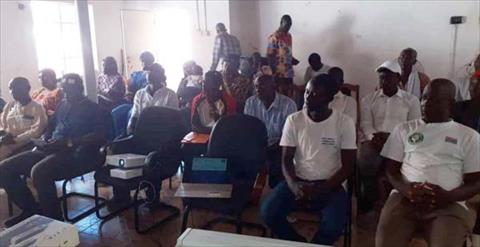The National Disaster Management Agency recently concluded trainings for community representatives within the various regions in the country.
The synergy is part of the implementation of a project dubbed-‘Using Drones and Early Warning Systems’ for pre and post floods disaster management in The Gambia.
Participants at these training includes, chiefs, Alkalolu, ward councilors, lady councilors and youth representatives, who were sensitized on the importance of the project, its objectives, phases partners and targeted beneficiaries.
The project, funded by the Government of India through the UN-India development partnership fund will be implemented in LRR, URR and the Greater Banjul Area.
The main aim of the project is to contribute to poverty alleviation by reducing flood risk and vulnerability and by extension increasing flood disaster resilience of the population.
Speaking at the event in Soma, the project coordinator, Kawsu Barrow described the project as ‘timely considering the increase in flood risk and vulnerability in the country’.
The project, he added, focuses on three components that is ‘using drones for pre and post floods disaster management, people centered early warning systems and to strengthen the capacity of the country to ensure that our resilience capacity is built against floods’.
Barrow indicated that the project will also strengthen climate information system in collaboration with the Department of Water Resources as well as the issue of food security and environment.
He revealed that the drones will be used to monitor and detect threats of flood in the surrounding and across the borders.
The education component of the project, he said, will support the Ministry of Basic and Secondary Education to mainstream Disaster Risk Reduction in their curriculum.
The Regional Disaster Coordinator for LRR Momodou BK Ceesay said training local people on disaster is very important, noting that local communities are the most affected.
He said his office will continue to collaborate with local authorities to strengthen disaster preparedness and response at regional level.
Ceesay added that such trainings will further enhance interaction with the regional disaster management team for effective intervention.
The NDMA officials advised the public to be more prepared while changing behaviors that will have negative impacts on the environment.
The climate change, he said, is real and contributes greatly to the increase in disaster recurrence, but also warned that many of the disasters are as a result of human activities on the environment and mode of settlement.






